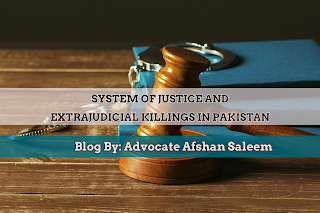System of Justice and Extrajudicial Killings in Pakistan
System of Justice and Extrajudicial Killings in Pakistan
Introduction:
Extrajudicial killing refers to a killing that is done without taking
legal and judicial action on behalf of the state institutions or officials,
i.e. without bringing the accused before the court of law, on the spot while
performing the work of the judge, lawyer and executioner himself. He should be
killed.
Unfortunately, our institutions have not been able to get out of this neo-demographic era, where the function of the state institutions was to keep a slave nation under control and ensure that they remain slaves. It's a pity that after gaining independence, we could not train our institutions in terms of a free nation and society.
Our laws also
reflect this authoritarian style, for example, adding such words in the draft
of laws that "this law and others" has overriding effect over all
laws in force for the time being (overriding effect)”, exempting various
officials from the law etc.
However, the enormous powers given to the police and law enforcement agencies in the context of the war on terror have been met. That's why now the "reasonable apprehension or reasonable suspicion" of the police and law enforcement agencies is enough to become a reason.
Officials cannot prove the case and charge against the accused that they had reasonable suspicion of a person and hence the conviction rate by the court, low in numbers.
Difference between Suspicion and reasonable Apprehension:
Suspicion is the act or feeling when
one cannot materially show any reason for it, an inference made only based on
some events.
On the contrary, in the language of
the law, reasonable apprehension or suspicion is not the same as the feeling of
suspicion of an ordinary citizen. If any police officer or law enforcement
official arrests a person on suspicion or charges him with an offence, he must
record the grounds for the suspicion and prosecute the offence in court. Also,
prove this accused with other evidence.
Extrajudicial Killings and Police Brutality:
According to the public survey and
reports of government accountability institutions, the police institution is a
precursor of fear instead of being a symbol of security among the people. People
have many complaints against this institution. People do not trust this
institution for their safety but try as much as possible not to go to the
police for any matter otherwise there is fear of further harm. That is why many
crimes are not reported.
Despite all these reports and
surveys, the government, unable to control corruption and political
recruitment, has not been able to do anything to improve this institution. Even
though every political party before coming into government has been showing the
people a dream that they will reform the institution as soon as they get the
government and end the police station culture, till today the police
institution is not free from political support.
System of Justice and Role of Media in Pakistan:
Anywhere in the world, if a person
is wanted by the law, even in a serious emergent situation or in a dangerous crime, and if shoot-at-sight orders has been issued for him, even then killing him is not
appreciated instead it is preferable to capture them alive
by shooting at his leg or wounding them so that they can be punished by the court to
strengthen the legal process and Rule of Law prevail in the country rather than
killing the suspect in front of his children like Sahiwal tragedy.
We are well aware of many such cases
like the Sarfaraz Shah case, Naqibullah Mehsud, the Sahiwal tragedy, and Rao
Anwar. Apart from this, 27 suspected criminals were extra-judicially killed by
the police in Karachi alone this year. But this is only what the media conveys
to us that many such persons were killed extra-judicially and these incidents
were not even reported anywhere. If these cases had not been reported in the
media and their videos had not become public, we can understand that they too
would have been lost in the dust of time.
In this situation, Article 14(2) of
the Constitution of Pakistan, which guarantees that no person shall be
subjected to torture for the mere purpose of obtaining evidence, is nothing but
a joke because before detention The accused is killed extra-judicially by
calling it a police encounter.
In addition to extrajudicial
killings, false cases and corruption are also indicators of the defects in
State institutions. Because of this, sinners escape punishment. In both cases,
public confidence in the law and justice system is lost.
Conclusion:
A strong legal system is the guarantee of a strong state. The sad thing
is that law enforcement is not seen at all in Pakistan. The entire justice
system is full of corruption. There is a system of punishment only for the weak
people, but the powerful class do not get any punishment from the court by
taking advantage of the loopholes in the legal system, using their influence
and other means. Therefore, this impression is strengthened that The law cannot
do anything to the powerful criminals.
Extra-judicial killings and other
similar incidents should be thoroughly and impartially investigated. Defects in
existing laws and regulations should be found and eliminated. The political
element should be removed from the state security institutions. The
accountability system should be strengthened. The effect of the legal system
benefiting a certain section is extremely negative on other sections of society.
Such factors have far-reaching effects on any society. At present Pakistan is witnessing
the results of the same.
It is the urgent need of the hour
that the government, institutions and people of Pakistan should work together
for its survival.
...........By Advocate Afshan Saleem




Comments
Post a Comment